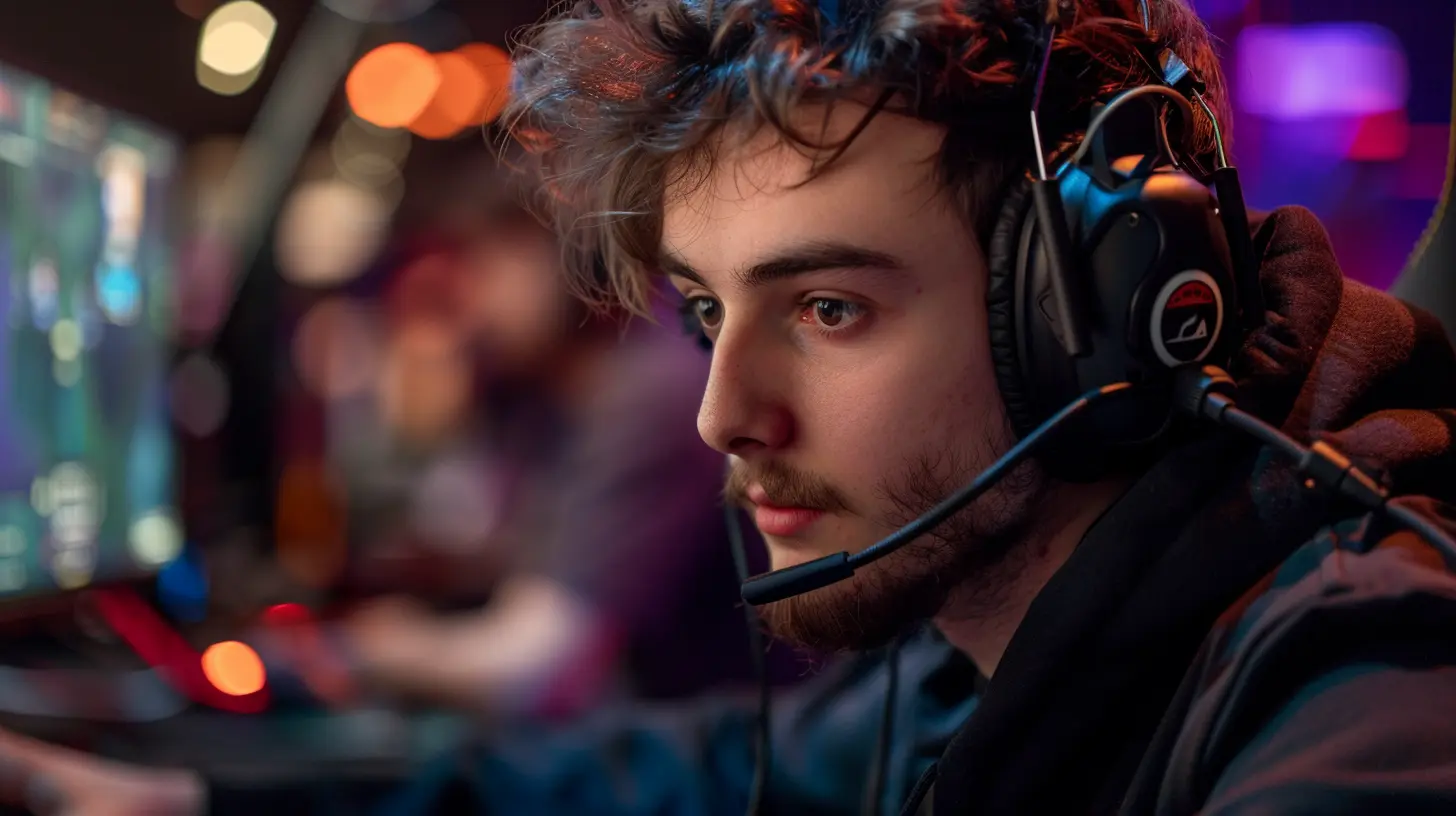The Rise of Collegiate Esports Tournaments: A New Frontier
21 October 2025
Hey there, fellow gamers and esports enthusiasts! Today, we're diving into a fascinating topic that has been brewing over the last few years: collegiate esports tournaments. Yep, you heard that right—video games are no longer confined to basements and casual living room setups. Now, they’re taking over college campuses, professional arenas, and even headlining student scholarships! It’s a wild, fast-evolving frontier that’s shaking up the gaming industry and traditional sports worlds.
Let’s break it all down, shall we?
What Are Collegiate Esports Tournaments?
If you’re picturing competitive gaming teams battling it out on dormitory Wi-Fi, think again. Collegiate esports tournaments are large-scale, highly organized competitions featuring college students representing their schools in epic video game matchups. These tournaments cover games like League of Legends, Valorant, Overwatch, and even sports titles like FIFA and Rocket League.Think of them as the NCAA basketball tournaments but instead of a physical court, we’re talking about virtual arenas lit up by RGB keyboards and high-tech gaming rigs. Teams strategize, practice, and compete just like traditional athletes—except their battlefields are digital worlds.
The Evolution of Esports on Campus
Esports in the Classroom? Well, Sort Of...
Believe it or not, esports have slowly been creeping their way into college campuses for years. What started as small, informal LAN parties organized by gaming clubs has grown into a full-fledged phenomenon. Colleges now have professional-grade esports facilities, scholarships for top players, and even dedicated coaches guiding teams.Just imagine telling your parents 10 years ago: “Hey Mom, Dad, I’m considering a college with a strong League of Legends program.” Their heads would’ve spun like a broken joystick! But hey, it's 2023, and gaming is no longer just a hobby—it’s a legit career path.
Why Now? Timing is Everything
The rise of collegiate esports tournaments isn’t some random fluke. Several factors worked together to create the perfect storm:1. Mainstream Popularity of Esports: We’ve all seen the clips of sold-out arenas where fans cheer on their favorite esports teams. These are multi-million-dollar events with sponsors like Coca-Cola and Intel. Colleges picked up on this momentum and decided, “Hey, why not us?”
2. Tech-Savvy Generation: Today’s college students grew up gaming. From PlayStation 1 to the Nintendo Switch, video games have been a staple of their lives since childhood. You know what they say: play to your audience.
3. Scholarships & Recruitment: Colleges realized they could attract top-tier talent (both academically and on the “digital battlefield”) by offering esports scholarships. Gaming prodigies now have a shot at higher education while pursuing their passion.
4. COVID-19 Pivot: When the pandemic hit, traditional sports were temporarily sidelined. Esports, already thriving online, emerged as a perfect replacement activity to bring communities together virtually.
Why Collegiate Esports Tournaments Are a Game Changer
Alright, let’s talk about why this is such a big deal. You might be thinking, "Okay, so kids are playing video games competitively in college. What’s the big fuss?" Trust me, it’s bigger than you think.1. Redefining Athletics in the Digital Age
Traditionally, college sports meant football, basketball, soccer—you know, physical games that required cleats, courts, and a whole lot of sweat. Esports flips this narrative. While you might not break a sweat gaming, the mental stamina, split-second decision-making, and teamwork required are just as intense.Plus, esports makes room for students who may not have fit into the traditional athlete mold. Anyone can participate, regardless of size, gender, or physical ability. It’s a level playing field (pun intended).
2. Bridging the Gap Between Gamers and Academics
For years, video games were viewed as a distraction from schoolwork. But now? They’re a legit academic opportunity. Many colleges are pioneering programs that combine gaming with education, such as esports management degrees, game design courses, and even broadcasting paths for future esports commentators.Esports isn’t just about playing games—it’s an entire ecosystem of career opportunities.
3. Creating Communities and Friendships
Let’s face it: college life can be isolating at times. Esports programs give students a chance to connect with like-minded individuals, form lifelong friendships, and foster a sense of belonging. Whether it’s strategizing before a match or just goofing off in Discord channels post-game, these teams bond tightly.4. Massive Industry Potential
The esports industry isn’t slowing down anytime soon. With global revenues expected to surpass $1.5 billion in 2023, collegiate esports tournaments are essentially the feeder pipeline for this booming business. Colleges are preparing students not just to play, but to thrive in roles like game developers, marketers, and event organizers.
What’s the Catch? Challenges of Collegiate Esports
Of course, like any new frontier, collegiate esports doesn’t come without its fair share of growing pains. Let’s talk about a few hurdles universities (and players) are facing.A. The Stigma Still Lingers
Despite its growth, esports sometimes struggles to be taken seriously. You’ve got skeptics saying, “It’s just kids playing video games. How is this a sport?” Overcoming this cultural stigma is an ongoing battle.B. Resources and Funding
Esports teams need top-tier equipment (we’re talking pro-level PCs, gaming chairs, and high-speed internet). Not every college has the budget to invest in these setups, meaning smaller schools might fall behind in the competitive scene.C. Burnout is Real
Esports might not involve physical exhaustion, but the grind is very real. Players can easily burn out from long practice hours and the pressure to perform, especially when balancing gaming with coursework.The Future of Collegiate Esports
Looking ahead, the future of collegiate esports looks pretty promising. More universities are hopping on the bandwagon, and with technological advancements, the possibilities are endless. Virtual reality tournaments? AI-driven coaching? Who knows what’s next?What we do know is this: gaming is here to stay. And as collegiate esports tournaments continue to grow, they’re not just creating gamers—they’re building leaders, innovators, and communities.
Final Thoughts: Where Do You Fit In?
If you’re a student reading this, maybe you’re thinking about joining your college’s esports team (or starting one if it doesn’t exist yet!). If you’re an alum or educator, perhaps you’re recognizing the value esports brings to a campus culture.No matter where you stand, one thing’s for sure: the rise of collegiate esports is more than a trend. It’s a revolution. So, buckle up—this is just the beginning.
all images in this post were generated using AI tools
Category:
TournamentsAuthor:

Lucy Ross
Discussion
rate this article
1 comments
James Jackson
Collegiate esports tournaments are reshaping the gaming landscape, fostering community, skill development, and potential career pathways for students. This burgeoning field not only enhances the college experience but also legitimizes gaming as a competitive discipline.
October 22, 2025 at 2:31 AM

Lucy Ross
Thank you for your insightful comment! I completely agree that collegiate esports are transforming the gaming landscape and providing valuable opportunities for students.


